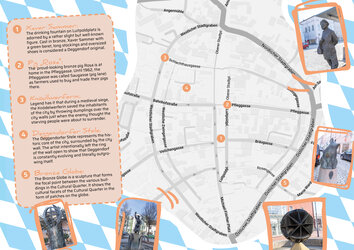
All shops and stores in Germany will be closed on Sunday.
Reallocating to a foreign country has never been an easy challenge. No matter if you are an expat, a migrant or an international student; having to adjust to a brand-new country with dissimilar environment and regional regulations can be quite the struggle. Most of the time, you will find yourself experiencing a culture shock. Culture shock is the confusion that a person may have when moving to a cultural environment, which is different from one’s own. Taking some time to learn about the local culture norms or acknowledging the basics of German living style will help you to overcome the oddities and make your residence here a lot smoother.
If you are planning your study at DIT in the next winter semester, it is recommended to first get your hands on doing an advanced culture review prior to your departure. I have highlighted some standards, which might seem bizarre to foreigners in their first experiences.
1. Punctuality
When it comes to German stereotypes, there is nothing better to describe the country’s nationals than their strict obligation of time and schedule. In Germany, if you have an appointment at a certain time, whether it is a consultation with the Professor, a checkup with the healthcare specialist or just a casual coffee date with your peers, you are expected to show up at the exact time. Five minutes late would even be considered as impolite and disrespectful. In some countries, like my homeland for instance, being punctual is usually just a personal expectation, not an obligation. Thus, even when people are expected to show up on time, arriving 5 minutes or eventually 15 minutes late are often deemed as acceptable. Therefore, I have grown up with a more casual attitude towards punctuality. Nonetheless, living in Germany has completely altered my perspectives and cultural habits. I have learned a handful of unspoken rules. One of which is to inform in advance, preferable 24 hours, if you cannot make it to a pre-scheduled appointment or at least an hour before if you are going to be late. Germans are taught to be punctual, now that you live here, you are expected to be on time too.
2. Personal space
Germans love their personal space. They expect their privacy to be respected, valued and preserved, both by acquaintance and strangers. Where I come from, an Asian country, personal space is close to nonexistent. Instead, people value closeness and always try to show as much affection towards each other as they can. On the other hand, for Germans in general, it is the 1 to 2 metres of space, which you need to maintain between yourself and the other person so that they might not have the feeling they are being harassed or otherwise harmed. Speaking of German standards, there are three types of spaces that one has to keep in mind. The intimate space, which is often reserved for one’s own partner; the personal space for family, friends and associates and the social space where one interacts with others, mostly unknown or unfamiliar people. The size of each space is determined by the person’s characteristics and preferences. Don’t get offended if the person you are talking to happens to stand a little bit too far away, it is not you, it is just their way of socialising.
3. Public display of affection
For native Germans, it is quite normal that you can show affection towards your loved one in public areas. It doesn’t matter if it is in front of strangers’ eyes, Germans do not have problems with displaying their sentiment publicly. Nonetheless, for people coming from different countries like Asians or countries with specific religions such as Indonesia or UAE, you might find it uncommon or rather awkward. You will not have to follow the same if it seems inappropriate in your culture but try to respect the differences and cultural significance of the country.
4. “Sonntag ist Ruhetag!”
“Sunday is rest day!” – Some Germans will definitely remind you of the importance of “Ruhetag” once or twice, if not more, throughout your time of living here. This is something which you will need to get used to, especially if you come from a bustling country, which is always hyperactive and festive, most of the days during the week, like mine. It could get somewhat depressing and distressing at first when you cannot find anything to shop or have no places to entertain yourself on Sundays.
All shops, apart from the ones in the airports or at the train stations, are closed on Sundays. The only places that are open throughout the whole week are bars and restaurants. There will also be fewer buses or trains. The ones that are still running will be operating at a reduced frequency. Thus, it would be wise to shop for your necessities on a workday and do not postpone it until the weekend as shops and malls usually get super crowded on Saturday. Thus, you will have to wait in a long queue to be able to get your stuff done.
5. German is essential for daily communication
Even though DIT offers a multinational environment of education, stepping out of the campus and getting on daily interactions with others, like the locals, is another story. Despite a high number of Germans being able to speak English fluently, you will still encounter others who might refuse or are unable to communicate in any other language asides from their mother tongue. Try to go to a local butchery or bakery and start ordering your food in English, you will see the confused faces of the staffs and find yourself being stuck in a desperate attempt to explain to them what you really want. Studying in Germany, it will be extra helpful if you can speak at least some common German words. When you are out and about, a basic level of German will give you greater convenience and access to most of the places and services. It is advisable to spend some time to learn German beforehand. Though, no fear! If you come to Germany with zero German knowledge, rest assure that DIT offers multiple language courses that can boost your language achievement in no time.
Ha Nguyen is an outgoing and benevolent Vietnamese native pursuing her Master’s degree at DIT’s European Campus Rottal-Inn who wishes to pass on the compassion of positive vibes through her enthusiastic writings.










